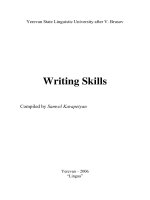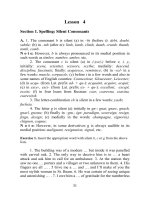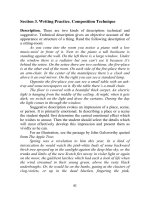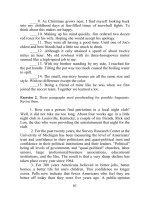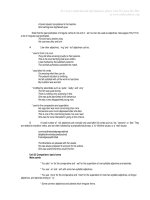Tài liệu Developing writting skills 1 part 4 pdf
Bạn đang xem bản rút gọn của tài liệu. Xem và tải ngay bản đầy đủ của tài liệu tại đây (147.08 KB, 10 trang )
Lesson 4
Section 1. Spelling: Silent Consonants
A. 1. The consonant b is silent (a) in –bt (before t): debt, doubt,
subtle; (b) in –mb (after m): limb, lamb, climb, dumb, crumb, thumb,
tomb, comb.
N o t e: However, b is always pronounced in its medial position in
such words as timber, number, amber, etc.
2. The consonant c is silent (a) in (-)sc(-) before e, i, y,
initially: scene, scientist, scissors, scythe; medially: descend,
discipline, fascinate; finally: acquiesce, reminisce; (b) in –scl- in a
few words: muscle, corpuscle; (c) before t in a few words and also in
some names of English counties: Connecticut, Gloucester, Leicester;
(d) in acqu- (from Lat. prefix ad- + qu-): acquaint, acquire, acquit;
(e) in exce-, exci- (from Lat. prefix ex- + qu-): excellent, except,
excite; (f) in four loans from Russian: czar, czarevna, czarina,
czarevitch.
3. The letter-combination ch is silent in a few words: yacht,
fuchsia.
4. The letter g is silent (a) initially in gn-: gnat, gnaw, gnash,
gnarl, gnome; (b) finally in –gm,- ign: paradigm, sovereign, resign,
feign, design; (c) medially in the words: champagne, signor(a),
chignon, cognac.
N o t e: However, in some derivatives g is always audible in its
medial position: malignant, resignation, signal, etc.
Exercise 1. Insert the appropriate word with silent b, c or g from the above
lists.
1. The building was of a modern … but inside it was panelled
with carved oak. 2. The only way to deceive him is to … a heart
attack and ask him to call for an ambulance. 3. At the station they
saw no one … porters and a villager or two unknown to them. 4. His
fingers are all … . 5 Give me a … and … and I’ll make of you the
most stylish woman in St. Beam. 6. He was certain of seeing unique
and astonishing … . 7. I owe him a … of gratitude for the numberless
31
favours he has done me. 8. All the … and uncertainty made her feel
miserable and unhappy. 9. The boy was … from birth but didn’t
suffer because of it, as he never realized what he lacked. 10. John
was … by the hypnotic atmosphere. 11. Bread … were always
scattered under the kitchen window and birds used to feast there. 12.
The dog … the bone, and it was more delicious than anything he had
ever tasted. 13. He got so … over the idea that he thought he should
go at once. 14. Then, above that humid silence, there came a nagging
song like the song of a … . 15. The boys were sure the treasure was
under the … old oak. 16. He … his teeth in pain but no moan
escaped his lips. 17. We had to … ourselves to doing without the
most necessary things. 18. I am a very bad … . I will do anything to
make a human being feel better even if it is unscientific. 19. The
epitaph on the … stone was solemn and beautiful. 20. … are
imaginary dwarfs living under the ground and guarding treasures.
B. 1. The letter-combination gh is silent in (a) –igh(t): high, sigh,
thigh, bright; (b) –eigh(t): sleigh, weigh, neighbour, height, weight;
(c) –aight: straight; (d) –aught: haughty, naughty, slaughter, taught;
(e) –ough(t): dough, ploughman, thorough, though, thought, etc.
2. The consonant h is silent initially in (a): hour, honest, heir;
(b) exh-: exhaust, exhibit, exhort; (c) gh-: ghastly, ghost, ghetto; (d)
kh-: khaki, khan, Sakhalin; (e) th-: thyme, Theresa, Thames, and
medially in: Mathilda, Anthony, Esther; (f) rh-: rhinoceros,
rheumatism, rhythm, rhetoric, Rhine, rheostat, and also finally:
catarrh; (g) wh-: whale, wheat, whence, white, whimsical, whelm,
whim, whiz, whisky, whirl, whisker, whisper; medially (a) between a
stressed and an unstressed vowels: Graham, prohibition, vehicle,
vehemence; (b) between a consonant and an unstressed vowel:
silhouette, gingham, burgher, and also in: spaghetti, Fahrenheit; (c)
in –ham: Birmingham, Tottenham, Buckingham, Durham, and finally
after a vowel: ah, bah, eh, oh, hurrrah, etc.
N o t e: wh stands for /h/ in: who, whole, whooping-cough, whore.
Exercise 2. Fill in the blanks with the words from the above lists.
1. He was not so large, - he ...only one hundred and forty
pounds. 2. The man next to me was a …man who had never been to
32
London and was most anxious to see St. Paul’s. 3. This American car
was indeed the finest … that had ever appeared in the village. 4.
When the storm was at its … the ship cracked in the raging waves. 5.
Whenever they came he would speak with great … about the misery
caused by idle and lazy habits. 6. Only a … analysis of the results
disclosed the secret of the phenomenon. 7. He was a heavy-…
champion and gave spectacular performances of physical strength. 8.
He looked upon the war as a … calamity, or a more … crime. 9. The
door of his … , who lives downstairs is shut like an angry face. 10.
His legs in … boots supported his bulky body like columns. 11. I
never thought that … could be any good – persuasion was my
weapon. 12. A … of relief escaped her lips when she saw that her
letter hadn’t been posted. 13. His … answer left no room for doubt.
14. The …-boat we met on our way back helped us with water.
C. 1. The consonant k is silent in kn- (in its initial position): knead,
knit, knee, kneel, knife, knight, knock, knob, knot, knuckle.
N o t e: However k becomes ck before n in medial position:
acknowledgement.
2. The consonant p is silent (1) initially in pn-: pneumonia,
pneumatic; ps-: in the words containing pseudo-, psych(o)-, psalm-;
pt-: pseudonym, Ptolemy, psychology; (2) medially in –spb-:
raspberry; (3) also in a few words: receipt, corps, sapphire,
cupboard, coup.
Exercise 3. Fill in the blanks with the words from the above lists.
1. The two families are … together by common interests. 2. He
… to pick up his hat. 3. She wandered into the fruit-garden, among
the … and currant bushes, without any wish to pick and eat. 4. The
ship had been badly … about by the storm. 5. What difference did it
make whether she had died of … or not. 6. Below the wardrobe was
a gas stove, and beside the bed was a wooden food … with a small
portable radio on it. 7. She took the … from the drawer and quickly
cut the loaf. 8. He thought that by signing this work with a … he
could mislead the reading public. 9. Our cook said that she hated …
dough. 10. The old woman had an unpleasant habit of scratching her
33
head with a … needle. 11. All parents need some knowledge of … .
12. People were standing about in … waiting for news.
Exercise 4. Copy the following sentences supplying the missing silent
letters. Translate the sentences.
1. On that day, August 6 1945, the first atomic bom_ was
dropped on Hiroshima. 2. It was ex_austing work, carried on, hour
after hour, at top speed. 3. I had to help him into the boat, for he had
brought back his gun and a _napsack heavy with provisions. 4.
Dum_ terror made him drop the hammer and rush out. 5. The end
came one morning after a month of illness, during which silence
rei_ned in the house and all the family went about on tiptoe. 6. In
post-war England forei_ners who showed their passports could have
goods sent home at a much lower price. 7. Aunt Laura wasn’t what
you’d call comfortably off, but she was an _eiress. 8. With the
invention of _neumatic tools many problems of technology were
solved. 9. No s_ientist worthy of the name could say such a thing.
10. A stout man in a red sweater came out and si_ned the book for
the driver. 11. The word ‘lady’ originally meant ‘bread-_neader’ and
‘lord’ – ‘bread-guarder’. 12. When people get very dull and are
almost ready to kill themselves for dullness, their doctors advise
them to have a change of s_enery, and a change of company. 13.
Aubrey said that if I posed before the Titian it would be wonderful
publicity for the ex_ibition. 14. Then he went to his camp and filled
his hat with cake-crum_s to feed the little birds. 15. I am very much
inde_ted to him and this inde_tedness is a burden to me. 16. All his
friends knew he was in the habit of going to a _sychiatrist now and
then. 17. He would have been unfei_nedly sorry to see his respected
friend duped and deceived.
D. 1. The consonant l is silent in: (a) –alf / alv-: calf, half,
calves, halfpenny; (b) –alm: alms, almond, balm, calm, palm,
salmon; (c) –a(u)lk-: chalk, stalk walk, Fa(u)lk; (d) –olk: folk, yolk,
Norfolk; (e) –oln / -olon: Lincoln, colonel; (f) –olm-: Holmes,
Stockholm; (g) could, should, would, and in inflected and derived
forms from them.
2
.
The consonant n is silent in –mn finally and in inflected
forms: autumn, column, solemn, condemn, hymn.
34
N o t e: However, n is always pronounced in their derivatives:
autumnal, solemnity, etc. But: solemnly has a silent n.
3. The consonants s and z are silent in some words of French
origin and in recent French loans: aisle, chamois, chassis, Illinois,
Arkansas, corps, isle, island, pince-nez, rendezvous, and in inflected
and derived forms from them.
Exercise 5. Fill in the blanks with the words from the above lists.
1. Smith meant to be … , but as they went along Queen Street
the perspiration began to break out on the back of his neck and the …
of his hands. 2. When they rode out in the morning they passed
cattle, rusty young bullocks with great horns, and a few cows and …
. 3. The hall was decorated with precious stones, the roof was
supported by … of gold. 4. She was guilty of a misdeed, which he
felt unable to … . 5. … in Moscow is mostly cold and rainy, because
of the constant northerly winds. 6. A group of … dancers came to the
town and performed in the town hall. 7. The piece of … cake fell
from my hands as I sat stupefied. 8. They swore a … oath never to
part, and to share all their joys and troubles. 9. The villa was
surrounded with …-trees and the view from the window was
marvellous.
E. The consonant t is silent (a) medially in –stl- and –st(h)m-: bristle,
castle, nestle, jostle, rustle, thistle, bustle, whistle, wrestle,
Christmas, asthma, and also postpone; (b) finally in –ften, -sten and
in some words of French origin: fasten, christen, hasten, moisten,
ballet, buffet, argot, debut, bouquet, and in inflected and derived
forms from them.
N o t e: However, t is pronounced in haste, pistol, Christ, soft,
hostel, crystal, etc.
Exercise 6. Copy the sentences, opening the brackets, and translate them.
1. The child (
ï»Õ³íáñí»É
) close to Alice. 2. The (
³Ùñáó
) had
been built in the year 1405 and there was still much of the original
structure standing. 3. I heard a (
ËßËßáó
) in the grass behind me and,
turning sharply, saw Dina Bond picking her way toward me. 4. I
stared into the darkness, the hairs on the nape of my neck (
怫-怫
35

